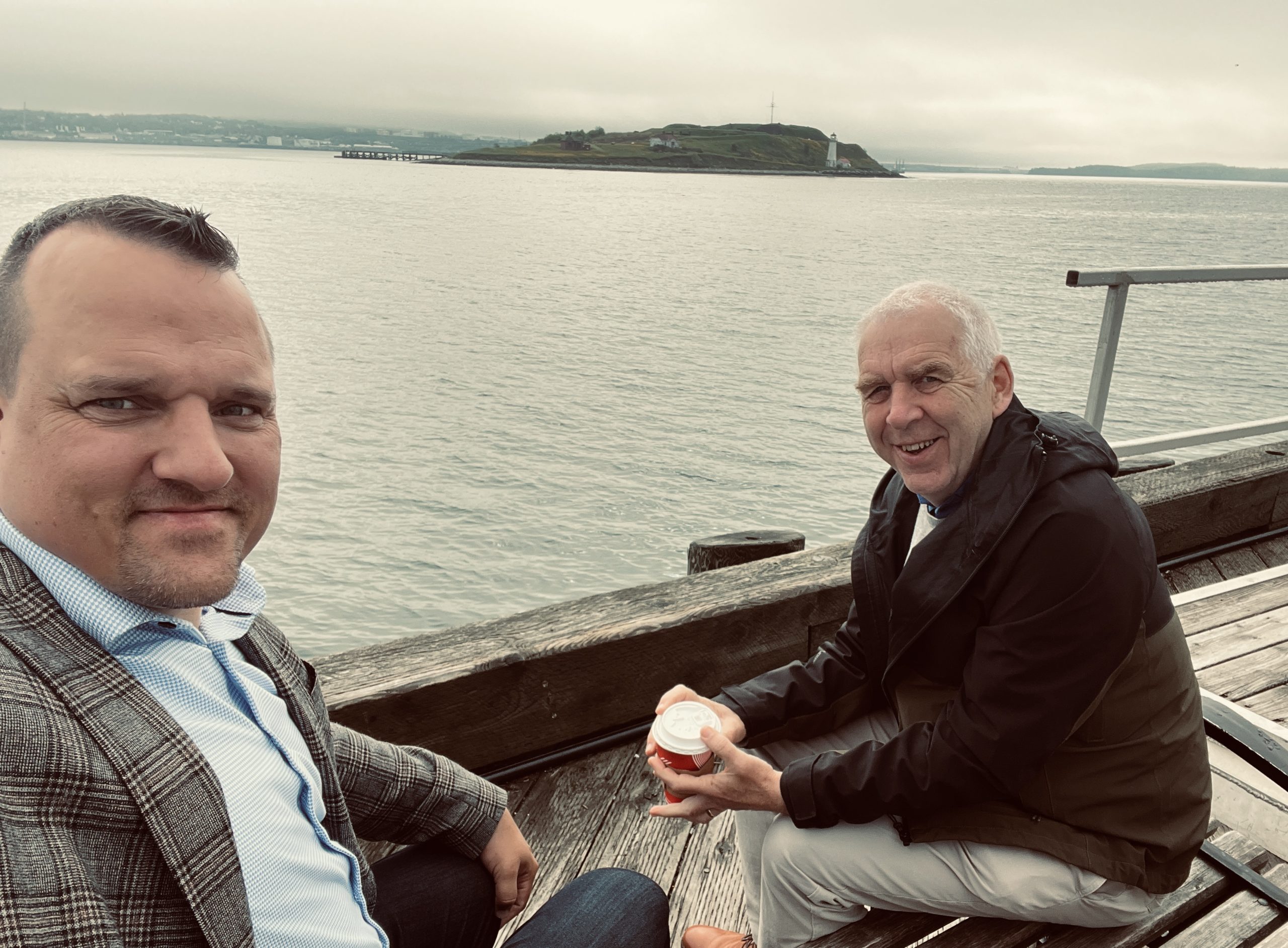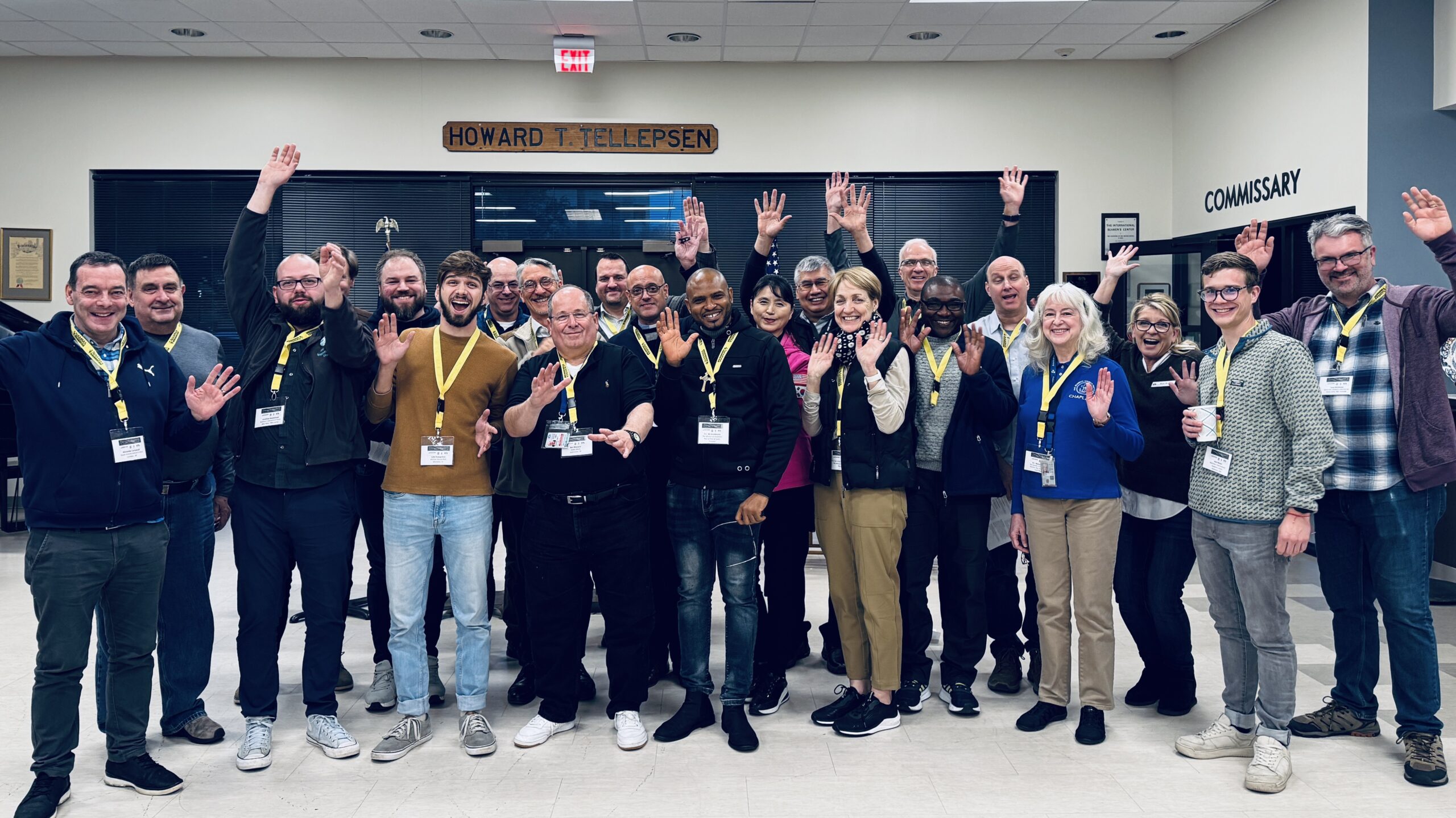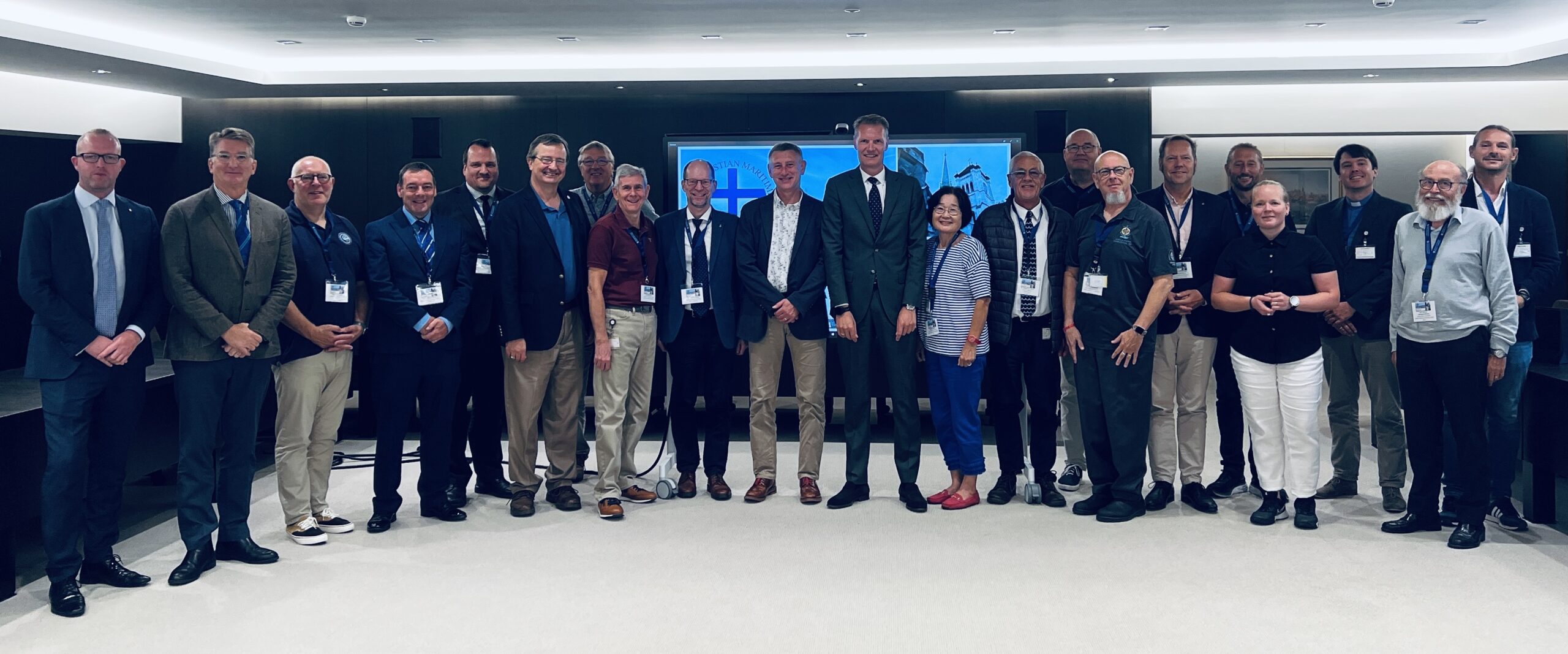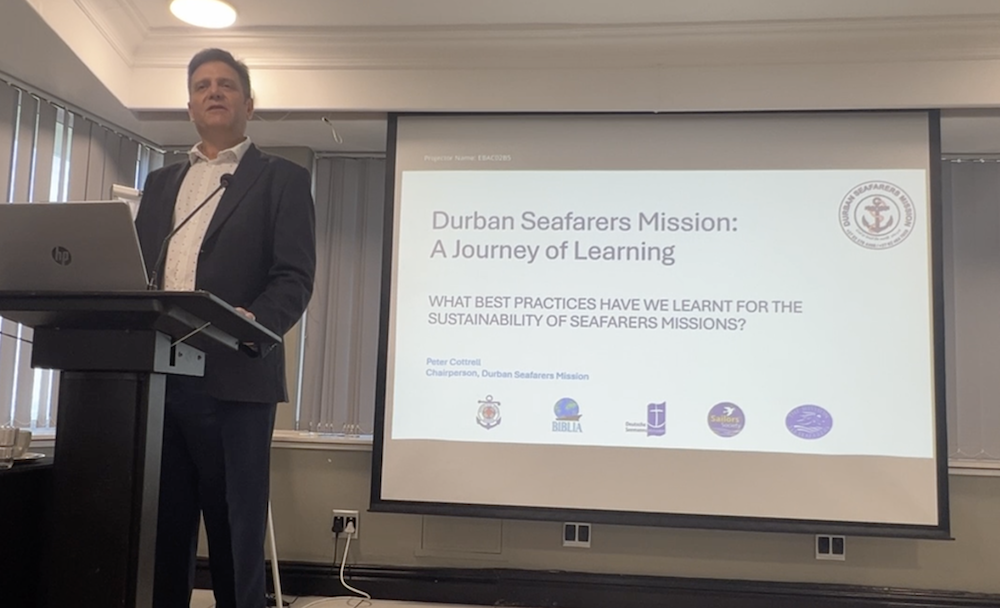On May 29, Dr. Jason Zuidema had a chance to sit down and talk with The Rev’d Canon Andrew Wright during a visit to Halifax, Canada. Andrew will soon retire from The Mission to Seafarers, so we wanted to get his perspective on seafarers’ welfare after more than a decade of service.
Andrew, can you tell us a bit about your experience? What has been a standout for you in your experience of serving seafarers for more than a decade?
Yeah, it’s been an amazing period.
I joined the mission at the beginning of 2013, roughly about the same time as you did, Jason. So, we’ve kind of worked in parallel, and if I might say so, it’s been an absolute pleasure to have worked with you and alongside you on so many matters. You’ve been an inspiration to so much maritime welfare work around the world, and you’ve been a great friend to me and a big personal support in many ways. So, thank you very much for that.
It’s been an incredible period of time. That period has obviously been marked by the pandemic in particular, followed by the Ukraine conflict, and now all those issues in the Red Sea. I constantly say the world’s crises are often felt first and hardest by seafarers and their families, and that remains true.
As I leave the mission, the world is a great deal more fragile than it was in 2013. Tragically, I suspect more trials and crises lie ahead in which seafarers will be the first to feel the hardships. That has been a big feature, and the way we worked together to sustain maritime welfare through the pandemic was probably the greatest crisis to hit seafarers since the Second World War, equaling that in some ways.
It was amazing to work together with others to sustain our work during that period when seafarers were suffering the most acute distress. Jason, if I might say so, the work you led on vaccination during that period was groundbreaking, and Mission to Seafarers was very glad indeed to support and help with that. That’s just one aspect of what we and others did during that period.
This period was also marked by significant changes within shipping. We’ve continued to see the speeding up of turnaround times and the increasing reduction in crew sizes, with all that’s meant for maritime welfare. It’s also been a period marked by the increasing availability of WiFi on board. Although far from universal, many ships now have much more affordable and stronger WiFi, which is clearly changing the communication scene, such an important part of what missions have been working on for over a hundred years.
This has been a significant factor we’re all adjusting to, and it affects what it means for centers around the world and so on. It’s been a period marked by change, and like all societies, we at Mission to Seafarers and all our colleagues’ societies within ICMA are adapting to that change in different ways.
One of the things that has marked this period for us at the mission is trying to ensure that our work is modern, fresh, and relevant to what seafarers need now, and that our centers are welcoming and provide the right kind of services in a changing world. There’s a lot that’s been changing and a lot that we’ve had to adjust to, and that remains a work in progress for us and others.
However, many of the challenges faced by seafarers remain constant, as they have done over so many years. The most important is the massive distance from home, family, and friends for such long periods, with all that means for their family lives and all the stresses and anxieties that brings, in addition to the other challenges seafarers face even in normal times.
I never cease to be moved by the extraordinary self-sacrifice of seafarers giving up so much for the betterment of their families and often their extended families. Much is changing, and much has changed, which presents a big challenge for all the societies as we continue to develop our work. But much remains constant. So, yeah, those are a few reflections.
What kind of advice would you have for other folks like myself or your successor, and the other leaders of the different ICMA organizations and seafarer centres around the world? What does it take to be a leader in seafarer welfare?
I think, well, I just, in relation to the ICMA thing,
I mean, one of the things I always say that has been really important to me is partnership. And I remain deeply supportive of the ICMA project.
I didn’t particularly want to be chairman of ICMA when I started, but in the end, I actually really enjoyed it. It was a pleasure to be working with you and my other colleagues on the board and beyond.
I think that if we’re going to be successful in working effectively with seafarers and using resources wisely to do the best we can for them, then working in partnership is critical. I would say to everyone across the sector that we need to continue working in the best partnership.
It can be problematic because sometimes we’re competitors as well as colleagues, and that can be an awkward tightrope to walk. However, in the end, I hope and believe that friendship wins out, and it’s critical. Not just friendships between societies, but the quality of partnerships we build within the wider shipping industry, with its organizations and companies, opens the doors to us in ports. These partnerships enable us access to ships, and at a time when shore leave and access to ships remain under pressure post-pandemic in many parts of the world, such partnerships have never been more important.
It’s a critical role for ICMA, and the relationships ICMA has with the ILO, the IMO, and beyond are really important to us all. The work you’ve done, Jason, on that front and in building those relationships has been critical. So, partnership is one of the things I would stress.
Another important aspect is remaining open and being prepared to adapt to change. We have wonderful people working for Mission to Seafarers, whether they’re paid or volunteers. This is true of all societies. I’ve met some incredible teams in many places across the world, and it’s amazing. However, many of those teams have been working in the same way for many years. It can be difficult to see new ways of working and developing your work, so keeping on the move and being open to change and development is really important. Sharing new, good practices is something that ICMA can and does do through its conferences and training, allowing us to learn from one another.
Apart from the Christian side of our work, which is fundamental and drives our desire to share God’s love with seafarers in practical ways, the importance of building the kingdom amongst seafarers remains critical to our mission. We are also a service provider within the industry. As one captain once said to me, “Happy seafarers are good seafarers; happy seafarers are safe seafarers. You make seafarers happy.” It’s a wonderful summary of what all our organizations across ICMA are trying to do. We are in the seafarer’s happiness and wellbeing business, and that is a vital service.
This is a message we all need to share with the industry. I believe they recognize it on the whole, that we have a critical place alongside others in keeping the industry running and ensuring the workforce is happy and well. It has been an absolute pleasure to be in this business over the last 11 or 12 years. I’ve loved working with all my colleagues across Mission to Seafarers and widely across our other ICMA organizations. Thank you, Jason, for all you’ve done on that front.
A last question and something you evoked: the fact that we’re the International Christian Maritime Association, and you work for The Mission to Seafarers. Often you’re asked to preach, speak, give prayers, or say blessings in different places. Do you have a favourite biblical text or Christian metaphor that helps you tell the story in the best way?
Well, it’s been one of the things I’ve tried to do every year. I mean, we’re fortunate in Christian maritime work because the Bible is so full of texts and stories about the sea, many of which are very familiar to us.
But I think one of the things that I’ve always loved is that picture after Paul’s shipwreck in Acts. After days of turmoil at sea, fearing the immediate loss of their lives, the ship was wrecked, and they all came ashore—seafarers, Roman soldiers, Paul—staggering up the beach through cold and freezing waters, just avoiding drowning. They arrived in what they later realized was Malta.
There’s that wonderful passage that says the natives built a fire and welcomed them because they were cold. I can’t remember the exact quote, but they were probably cold and naked. It’s a wonderful picture of hospitality to me.
I’ve often had that picture in mind because that’s what we try to do in our ports around the world and through our wider projects. It’s to light that fire, keep the fires burning, and make sure that seafarers, in whatever ways we offer, feel warmly welcomed, loved, and cared for. That is essentially our Christian vocation.
So I’ve always loved that story among many other Bible stories and texts.
Thank you.
[The interview text has been lightly edited for grammar and clarity – please listen to the audio for the full interview].





